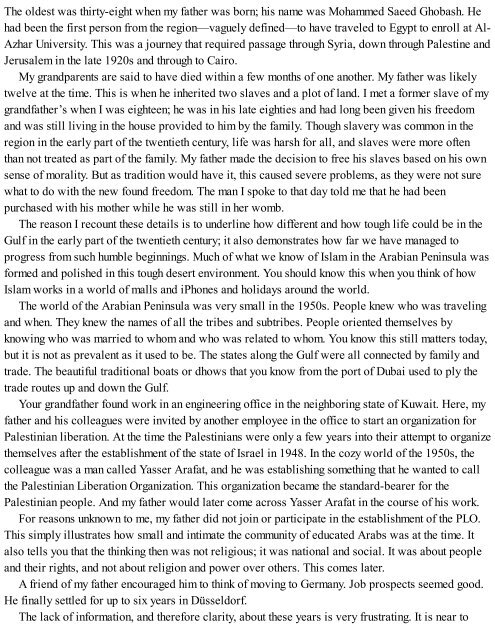1250119847
Create successful ePaper yourself
Turn your PDF publications into a flip-book with our unique Google optimized e-Paper software.
The oldest was thirty-eight when my father was born; his name was Mohammed Saeed Ghobash. He<br />
had been the first person from the region—vaguely defined—to have traveled to Egypt to enroll at Al-<br />
Azhar University. This was a journey that required passage through Syria, down through Palestine and<br />
Jerusalem in the late 1920s and through to Cairo.<br />
My grandparents are said to have died within a few months of one another. My father was likely<br />
twelve at the time. This is when he inherited two slaves and a plot of land. I met a former slave of my<br />
grandfather’s when I was eighteen; he was in his late eighties and had long been given his freedom<br />
and was still living in the house provided to him by the family. Though slavery was common in the<br />
region in the early part of the twentieth century, life was harsh for all, and slaves were more often<br />
than not treated as part of the family. My father made the decision to free his slaves based on his own<br />
sense of morality. But as tradition would have it, this caused severe problems, as they were not sure<br />
what to do with the new found freedom. The man I spoke to that day told me that he had been<br />
purchased with his mother while he was still in her womb.<br />
The reason I recount these details is to underline how different and how tough life could be in the<br />
Gulf in the early part of the twentieth century; it also demonstrates how far we have managed to<br />
progress from such humble beginnings. Much of what we know of Islam in the Arabian Peninsula was<br />
formed and polished in this tough desert environment. You should know this when you think of how<br />
Islam works in a world of malls and iPhones and holidays around the world.<br />
The world of the Arabian Peninsula was very small in the 1950s. People knew who was traveling<br />
and when. They knew the names of all the tribes and subtribes. People oriented themselves by<br />
knowing who was married to whom and who was related to whom. You know this still matters today,<br />
but it is not as prevalent as it used to be. The states along the Gulf were all connected by family and<br />
trade. The beautiful traditional boats or dhows that you know from the port of Dubai used to ply the<br />
trade routes up and down the Gulf.<br />
Your grandfather found work in an engineering office in the neighboring state of Kuwait. Here, my<br />
father and his colleagues were invited by another employee in the office to start an organization for<br />
Palestinian liberation. At the time the Palestinians were only a few years into their attempt to organize<br />
themselves after the establishment of the state of Israel in 1948. In the cozy world of the 1950s, the<br />
colleague was a man called Yasser Arafat, and he was establishing something that he wanted to call<br />
the Palestinian Liberation Organization. This organization became the standard-bearer for the<br />
Palestinian people. And my father would later come across Yasser Arafat in the course of his work.<br />
For reasons unknown to me, my father did not join or participate in the establishment of the PLO.<br />
This simply illustrates how small and intimate the community of educated Arabs was at the time. It<br />
also tells you that the thinking then was not religious; it was national and social. It was about people<br />
and their rights, and not about religion and power over others. This comes later.<br />
A friend of my father encouraged him to think of moving to Germany. Job prospects seemed good.<br />
He finally settled for up to six years in Düsseldorf.<br />
The lack of information, and therefore clarity, about these years is very frustrating. It is near to
















